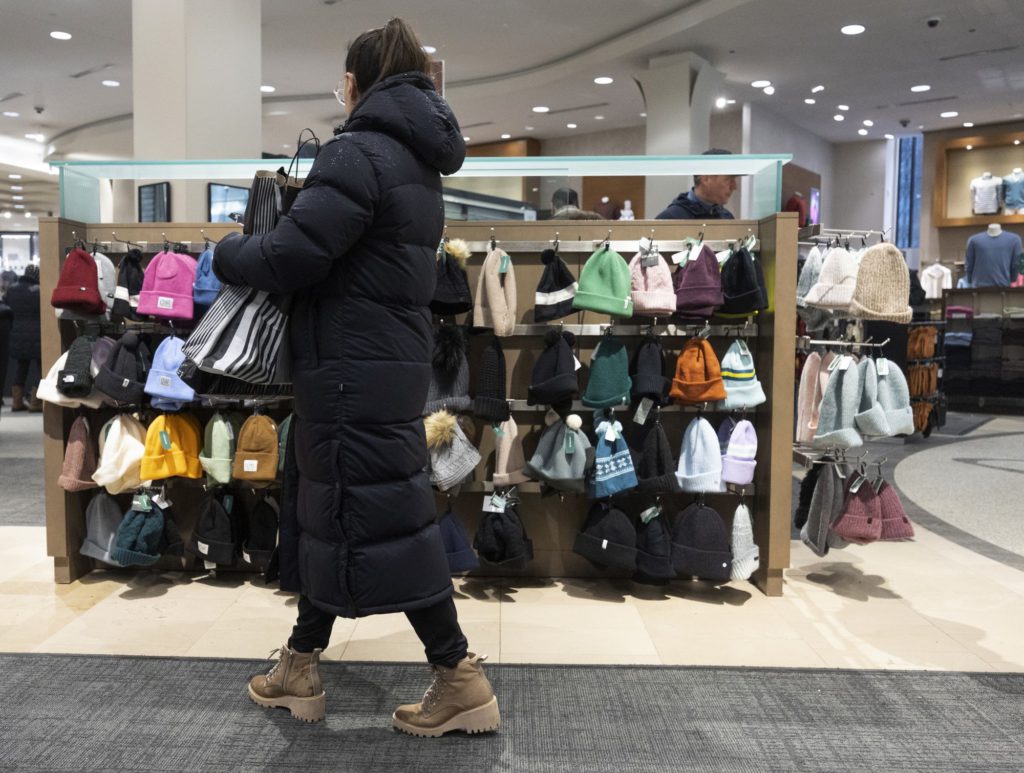Inflation and the Bank of Canada’s favored measures of underlying price pressures are cooling, suggesting that an expected increase to interest rates next week may be the last one for a while.
(Bloomberg) — Inflation and the Bank of Canada’s favored measures of underlying price pressures are cooling, suggesting that an expected increase to interest rates next week may be the last one for a while.
The consumer price index rose 6.3% from a year ago, Statistics Canada reported Tuesday in Ottawa, slower than the 6.4% gain expected in a Bloomberg survey of economists and down from 6.8% in November. On a monthly basis, the index fell 0.6% in December, the biggest drop since April 2020.
Two key yearly measures tracked closely by the central bank — the so-called trim and median core rates — edged lower, averaging 5.15% from an upwardly revised 5.25% a month earlier.
Tuesday’s report shows rapid rate increases over the past ten months are starting to temper price gains, though inflation remains well above the 2% target. The data support the view that the end of one of central bank’s most aggressive tightening cycles is in sight, with Governor Tiff Macklem likely to deliver one more hike on Jan. 25 before pausing.
“Core inflation eased ever-so-slightly, but the slow pace of improvement will bring little comfort to policymakers,” Benjamin Reitzes, a strategist at Bank of Montreal, said in a report to investors. “While the direction of inflation is at least mildly encouraging, there’s nothing in this report to keep the Bank of Canada from hiking rates another 25 basis points at next week’s policy meeting.”
The loonie strengthened about 0.3% after the release to C$1.339 per US dollar at 10:17 a.m. in Ottawa. Bond yields were little changed.
While lower gasoline prices led to a large pullback in December’s headline inflation rate, slower price growth was offset by increases in mortgage interest costs, clothing and personal care supplies. Shelter was again among major contributors to price gains, with mortgage interest and rent up 18% and 5.8% from year ago, respectively.
Consumers paid 13.1% less at gasoline pumps in December compared with a month earlier, also the largest monthly decline since April 2020, reflecting lower oil prices amid concerns over a slowing global economy and reduced demand after China’s surge in Covid cases.
Grocery prices also eased marginally. The cost of food purchased from stores rose 11% from the previous year, compared with 11.4% in November, with price growth hovering around 11% for the last five months.
Easing price pressures were widespread across Canada, with all provinces posting slower year-over-year gains in December.
The inflation numbers — the last major input into the central bank’s first policy decision of the year — follow a string of stronger-than-expected data. Early estimates suggest economic output is on track to expand at an annualized rate of 1.2% in the last quarter of 2022 — more than double the Bank of Canada’s forecast. Last month, the labor market blew past expectations and added more than 100,000 jobs, while the unemployment rate fell to near a record low of 5%.
Quarterly Bank of Canada surveys released Monday showed consumer expectations for short-term inflation holding at a record high, and business sentiment falling to its lowest since the pandemic.
The central bank said last month that future hikes would be guided by economic data, and that underlying price pressures and inflation expectations will play a key role in determining when interest rates will stop rising, along with economic output and the jobs market. Most economists expect Canada to enter a technical recession at the beginning of this year.
Macklem and his officials have already raised borrowing costs by 4 percentage points since March, bringing the benchmark overnight rate to 4.25%.
After Tuesday’s report, overnight swaps traders put the odds of a 25-basis-point hike at nearly 90%, up from about 80% earlier.
“The disinflation momentum is already underway and I think it’s going to gather steam,” David Rosenberg, founder of Rosenberg Research, said on BNN Bloomberg Television, adding that the central bank will likely bring rates to 4.5% next week.
“This is the last one for the cycle. They’re going to go on hold and they’re going to wait and see. And they’re going to talk a lot more about the policy lag,” he said.
–With assistance from Erik Hertzberg and Sandra Mergulhao.
(Updates with economist reaction.)
More stories like this are available on bloomberg.com
©2023 Bloomberg L.P.










